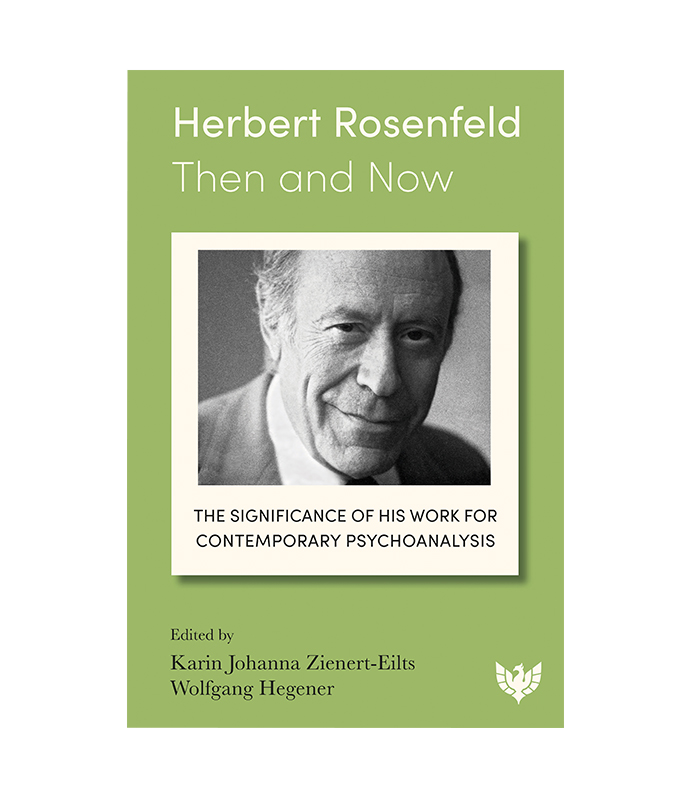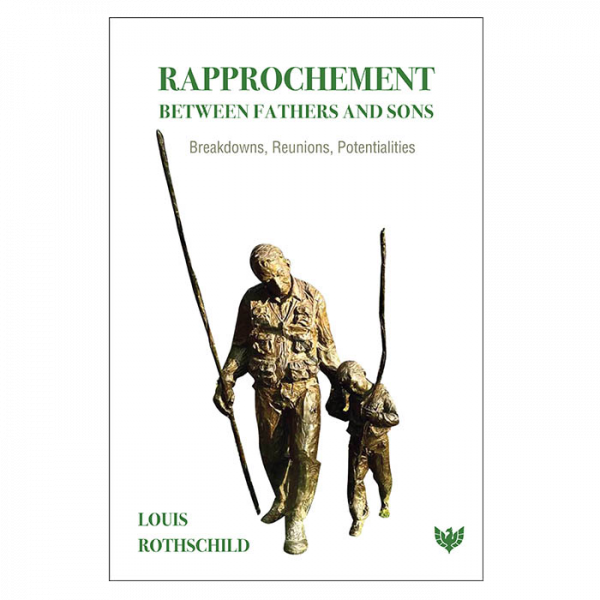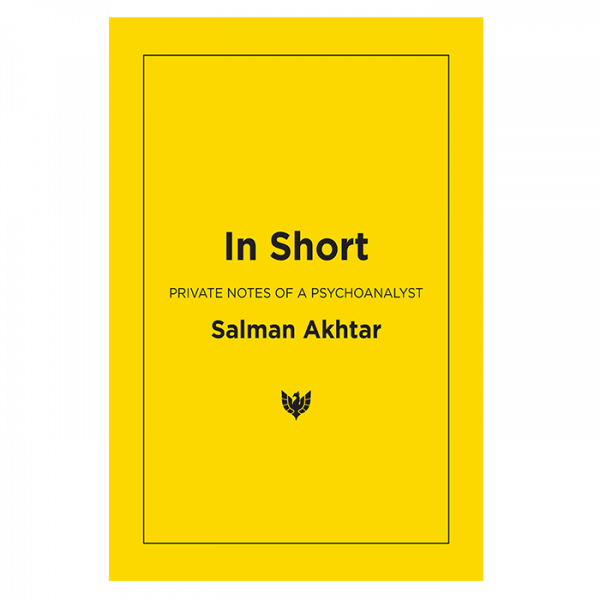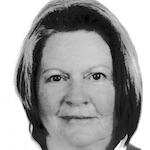This collection presents new insights into the life and work of Herbert Rosenfeld and his continuing influence on psychoanalytic theory and practice. It includes accounts from both personal and professional perspectives and is illustrated with 55 black and white images.
Part I looks at historical perspectives and includes Karin Johanna Zienert-Eilts’ excellent biography of Rosenfeld, Angela Rosenfeld’s personal view of her father, Ronald Britton’s discussion of the distinction between “defensive” and “destructive” narcissism, and Claudia Frank’s look at the iconic figures of Kleinian thought. Part II shines a light on Rosenfeld’s extensive supervisory work with a highly personal account from Riccardo Steiner about experience in Italy, Klaus Wilde on Rosenfeld’s significance for German psychoanalysts, and reminiscences and afterthoughts from Angela Goyena. In the descriptions of his clinical work in Part III, Franco De Masi, Hans-Jürgen Eilts, Carolin Haas, and Nils F. Töpfer demonstrate how Rosenfeld’s theoretical discoveries – especially his concept of destructive narcissism – and his related clinical and technical recommendations not only continue to facilitate psychoanalytic work with difficult patients today, but also made this work possible in the first place.
The final part of the book examines the sociopolitical applications of Herbert Rosenfeld’s concept of destructive narcissism. It begins with a significant paper from Herbert Rosenfeld: Applying my theory of psychosis to the Nazi phenomenon. This is followed by an interview of Rosenfeld by Hermann Beland and two chapters from the editors. Wolfgang Hegener examines how Herbert Rosenfeld can help us to understand Nazi perpetrators, with a particular focus on Adolf Eichmann, and Karin Johanna Zienert-Eilts takes the lens of destructive narcissism to destructive populism to cast new light on the phenomenon.
Rounded out by a bibliography of Herbert Rosenfeld’s most important writings, an extensive appendix of documents, photographs and three previously unpublished letters which are of historical significance, and prefaces from Irma Brenman Pick and John Steiner, this volume is a must-read for clinicians, academics, and trainees.





 Karin Johanna Zienert-Eilts, Dr. phil. Dipl.-Psych., is a psychoanalyst (DPG/IPV) in private practice in Berlin and a lecturer at the Psychoanalytic Institute of Berlin. She works on the topics of psychoanalytic theory development, history of psychoanalysis, processes in groups as well as socio-political topics and has published books and many journal articles on her research.
Karin Johanna Zienert-Eilts, Dr. phil. Dipl.-Psych., is a psychoanalyst (DPG/IPV) in private practice in Berlin and a lecturer at the Psychoanalytic Institute of Berlin. She works on the topics of psychoanalytic theory development, history of psychoanalysis, processes in groups as well as socio-political topics and has published books and many journal articles on her research. Wolfgang Hegener, Priv.-Doz. Dr. phil., is a psychoanalyst in private practice in Berlin, a training analyst (DPG, IPV, DGPT), and a university lecturer in cultural studies at the Humboldt University in Berlin. His main areas of interest are the Jewish roots of psychoanalysis, the psychoanalysis of anti-Semitism, and the relationship between psychoanalysis and philosophy. He has published a number of books and journal articles, and is co-editor of Jahrbuch der Psychoanalyse. His most recent book is Im Anfang war die Schrift. Sigmund Freud und die Jüdische Bibel (2023).
Wolfgang Hegener, Priv.-Doz. Dr. phil., is a psychoanalyst in private practice in Berlin, a training analyst (DPG, IPV, DGPT), and a university lecturer in cultural studies at the Humboldt University in Berlin. His main areas of interest are the Jewish roots of psychoanalysis, the psychoanalysis of anti-Semitism, and the relationship between psychoanalysis and philosophy. He has published a number of books and journal articles, and is co-editor of Jahrbuch der Psychoanalyse. His most recent book is Im Anfang war die Schrift. Sigmund Freud und die Jüdische Bibel (2023).
Vic Sedlak, training and supervising analyst and President of the British Psychoanalytical Society –
‘This beautifully constructed book describes Herbert Rosenfeld’s groundbreaking theoretical and technical contributions to the psychoanalytic understanding of psychotic processes in the individual and in society in the context of his personal history, so emblematic of the sociopolitical turmoil of Europe in the middle of the twentieth century. It will be invaluable to clinicians who treat borderline and psychotic patients and who struggle to understand the dominance that destructive processes can have on the human mind. It will also be of great interest to students of social and political science; the book is an outstanding example of the application of psychoanalytical thinking to the understanding of historical and contemporary political movements and institutions.’
Helen Schoenhals Hart, training and supervising analyst of the German Psychoanalytical Association (DPV) and of the San Francisco Center for Psychoanalysis (SFCP) –
‘Herbert Rosenfeld, one of the first to conduct psychoanalysis with psychotic patients, comes to life in this book. The editors have spared no effort in gathering records and testimonies: letters, key articles, and recollections and critical engagements from numerous colleagues, together with reminiscences from his daughter Angela Rosenfeld. Documentation is impeccable. Several contributions build on Rosenfeld’s groundbreaking concept of “destructive narcissism”, so useful clinically and extended, mostly by others, to political and social phenomena. His own seminal application of this concept to the Third Reich is included: the closing remarks in a 1984 presentation to the German Psychoanalytical Association in Wiesbaden. (The complete lecture in English is published here for the first time.) As someone who participated in Rosenfeld’s casuistic seminars in Heidelberg in the early 1980s, I feel very much put back in touch with the warm human being I knew — and with the teacher whose intuition, rooted in vast experience, never ceased to amaze me.’
Prof Heinz Weiss, head of the Medical Department and member of the Directorate of the Sigmund-Freud-Institute, Frankfurt a.M., Chair of the Education Section of the ‘International Journal of Psychoanalysis’ –
‘This is an amazing book that traces the work of Herbert Rosenfeld, his personal life and biography, his pioneering work with borderline and psychotic patients as well as his conceptual thinking. It contains an article by Rosenfeld himself and sketches his influence as a supervising analyst in different countries. Special emphasis is put on the sociopolitical dimension of his work on destructive narcissism. The editors and authors are renowned analysts who are familiar with Rosenfeld’s thinking and clinical practice. Angela Rosenfeld contributes a moving personal view of her father. The book includes a new preface from John Steiner, added to Irma Brenman Pick’s foreword to the German edition. An appendix contains many documents and photographs of Herbert Rosenfeld and his family. In my view, this book is a must-read for all those who are interested in Herbert Rosenfeld and the development of Kleinian thought.’
Marco Conci, The Psychoanalytic Quarterly, 2025, 94:3, 557-570 –
‘This important book represents a very competent work of love by the editors, the contributing authors, and the colleagues who worked to make this anthology possible, all of them composing a unique international network […] Only by accepting, valuing, and trying to integrate such different perceptions, can we come to a realistic evaluation of [Herbert Rosenfeld’s] legacy.’
Géraldine Le Roy, Le Coq-Héron, No. 262, 2025/3 –
‘This is a work of great richness, with many facets, [and] a valuable work that invites us to think’